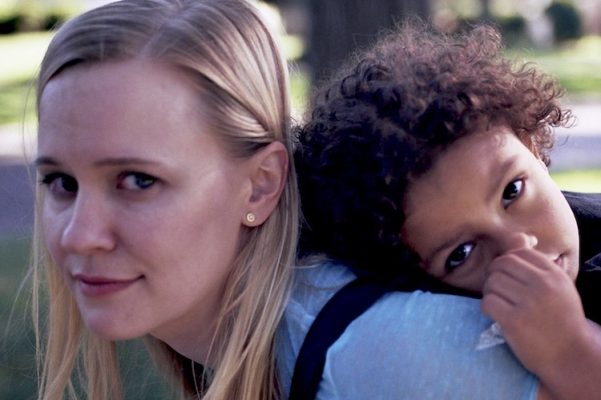Most films would baulk at a scene showing the faces of two lovers daubed in liberal quantities of menstrual blood the morning after the night before. But most films are not Saint Frances, a minor miracle of a comedy drama that freshens up the genre, if not the bedsheets, with great writing and a willingness to tackle big topics with disarming frankness.
Bridget (Kelly O’Sullivan) is a woman whose life feels stalled at 34. She works as a waitress (or ‘server’ as she prefers) and worries that she should have achieved more. Over the course of one summer she accidentally gets pregnant, decides to have an abortion, and becomes a nanny to the lively six-year-old daughter of a mixed-race lesbian couple. All of these things prove quietly seismic as she reevaluates the criteria she’s hitherto been using to quantify her successes and failures.
Co-written by Thompson and O’Sullivan, a real-life couple, Saint Frances combines feather-deft storytelling with a pugnacious boldness in its depiction of modern womanhood. This is exemplified in the character of Bridget, played with winning openness by O’Sullivan. Bridget is the type of woman who knows her own body, but doesn’t always listen to it. She’ll have an abortion without any moral agonising (and it’s shocking just how radical that still seems), but will ignore persistent side-effects. She’s also the type who will profess herself a lapsed Catholic, but retain a baffling adherence to the rhythm method. O’Sullivan, hitting an everywoman sweet spot somewhere between Mackenzie Davis and Kate McKinnon, allows Bridget to be occasionally irritating, flighty and contradictory, confident that there’s an inherent decency that shines through.
This is teased out in her relationships, not least with little Frances (Ramona Edith Williams), a fierce and intelligent girl, whose precocious and curious nature is a natural consequence of her upbringing, as well as much of the film’s humour. Her two mums, Maya and Anna (Charin Alvarez and Lily Mojekwu), could have been caricatures but the thematic scope is widened to include a moving depiction of postpartum depression (Alvarez is especially good) and Anna’s sense of guilt over having to work late to support her family. Great too is Bridget’s tentative relationship with sweet, sensitive Jase (Max Lipchitz) who deals with issues like unexpected periods and abortions with zero awkwardness and impressive emotional maturity.
If this all sounds relentlessly right-on, you would be correct. Saint Frances could easily have ended up solely as a perfect storm of liberal issues forced into the shape of a movie, and its openness and lack of judgement on certain issues are likely to rub some more conservative viewers up the wrong way. But the simple brilliance is that every aspect of the writing is in service to the characters and used to make them more rounded and human.
O’Sullivan and Thompson’s approach mirrors the success that Emily V. Gordon and Kumail Nanjiani achieved with the celebrated The Big Sick. That film was admittedly drawn from the real life experiences of its writers, but both follow the principle of flawed, abundantly human protagonists navigating a straightforward and engaging narrative with empathy and wit. Too often characters are mere passengers in a series of plot points, but in Saint Frances, the focus is always pulled tightly back to them as people. In this way, the movie mostly avoids potential accusations of proselytising.
Saint Frances does occasionally indulge in some of the standard cliches of the modern indie comedy-drama. The mandatory winsome, wistful acoustic guitar score is very much in evidence, for example. It’s also occasionally a little didactic, such as in one scene where Maya and Frances win over a snotty mother who objects to both public breastfeeding and same-sex parenting. However, even when such tropes as indulged there is usually a little added spice that undercuts them, such as a dance montage set to The Runaways. A sardonic Annie pops Bridget’s indulgent fun: “You should read up on what happened to The Runaways when they were recording these.”
Saint Frances is such a well-crafted, empathetic and entertaining film that its more generic elements can be easily forgiven. Especially so, given just how daring it is in tackling still controversial themes. Praise should also go to Alex Thompson as a director. He wisely keeps his camera inconspicuous and unobtrusive, letting nothing detract from his hugely impressive cast. If he allows himself a little warm, soft-focus glow come the end it’s well-earned, as is a slight nod towards sentiment. Saint Frances really is a film that deserves the widest possible audience, as it has the potential to be a special film for many people.
Available on Curzon Home Cinema as part of Edinburgh Film Festival at Home from Thu 25 Jun 2020
Available on demand from Fri 10 Jul 2020 on iTunes, Amazon, Sky, Virgin, Google, BT, Microsoft and Curzon Home Cinema
